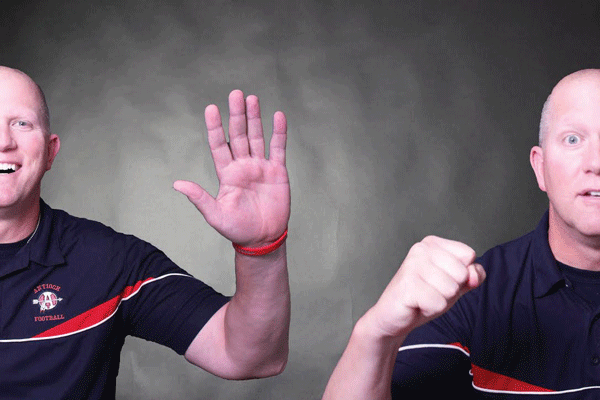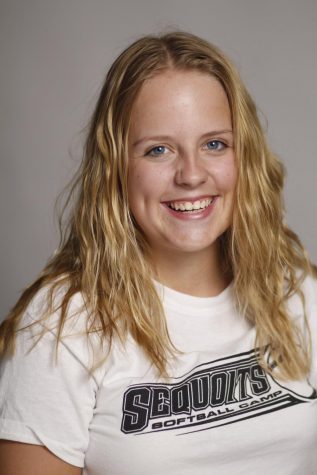The Coaching Effect
Coaching is their job, but going above and beyond is what makes an impact like no other on their athletes.

For the coach, it was just helping with homework, an extra hour after practice to work on throwing or just a person to talk to. But to their athlete, it was the start of something great. This is the coach that stood out in the athlete’s mind and made a lasting impression on them. These relationships built on and off the field have improved not only the athlete’s performance, but their attitude towards the sport. For many athletes at Antioch, finding a coach who makes them better on and off the field is easy. For senior Gretchen Wagner, this bond between her and head JV field hockey coach Dawn DeServi started her sophomore year. Two years later and she has built a relationship with her coach that she will remember forever. DeServi began to stand out in Wagner’s mind one day a few years ago.
“[I remember] one day I was just having a really rough day, and Dawn was there to give me great advice and just make me feel better,” Wagner said.
DeServi’s want to go above the basics and help her athletes did not stop there. She has helped many of her athletes overcome their challenges on and off the field. According to Wagner, DeServi always makes time for her athletes when they need her.
“If I texted her and asked her a question, she would respond immediately,” Wagner said. “She will [always] give me good advice about whatever is going on.”
For Wagner, it is these small things that make her coach have a lasting impact on her. It was helping her on the field to become a better player and leader, as well as off the field helping her through rough times in her life.
According to Wagner, this parent-like attitude from DeServi has made her team’s environment more positive and made the team stronger all around. From helping them improve in the game to helping them through a bad day, the teams knows that they can count on DeServi and that no matter what, she will always be there.
Another Antioch athlete who has felt the impact of his coach is junior Max Barton. Barton has been running track and field and cross country for three years. Head cross country and boys track and field coach Christopher Bailey has gone above what he needed to for Barton. For Barton, seeing Bailey’s role model attitude started at practice.
“At practice, you can just tell that he is passionate,” Barton said. “Not only for [his athletes], but for running as well, and that is almost essential for a coach.”
Bailey was a college athlete, running track and field and cross country for Illinois State University, and was very successful. He has been coaching and teaching at Antioch for nine years. According to Barton, this helped build a trust for his coach right away. This also made him believe in the benefits of training that Bailey tells them to do. Bailey’s knowledge has given the runners the ability to connect to Bailey as more than just a coach.
“He’s very good at appealing to others,” Barton said. “He’s a very good role model because he was a good runner himself, and that appeals to a lot of people”
According to Barton, the whole team trusts Bailey’s actions in and outside of their practices and meets. Not only has Bailey made an impact on Barton, but on his teammates as well. According to Barton, one of Bailey’s biggest impacts is his encouragement to bring the team closer together.
“He wants us to do a lot of team bonding things, like pasta parties,” Barton said. “He highly encourages it and it’s nice.”
This not only brings the team closer together, but it creates a team atmosphere that is positive and makes the team like a family. Yet for Barton, the thing that makes Bailey stand out more than any other coach he has had is the little things he does.
“It’s the little things,” Barton said. “Like the emails he sends to us before races, encouraging us to do our best and letting us know everything that is happening and the cheering during races and practices.”
These little things have not only helped Barton improve on his natural talent and run on the Varsity track and field and cross country teams for all three of his years, but also develop a love for the sports he is in.
While Barton and Wagner both find great qualities in their coaches, it is the things they do that go above and beyond that will make them remember and appreciate their coaches for their entire lives.
When push comes to shove
A coach defines a large part of a player’s experience on a sports team. They run the practices, create drills, push disciple and most importantly, lead the team. Despite this, a coach can have a lasting impact on a player’s performance and mindset.
At Antioch Community High School, there are 23 different sports teams. Nine of them are fall sports, with a variety of coaches leading the teams. The success of Antioch teams can be attributed partially to coaches. Coaches can help their players perform well and they should treat their players well to create a successful team.
Senior David Lonski is a member of the Varsity soccer team. He explained how a coach should be straightforward with his or her players.
“You can’t just sugarcoat while coaching,” Lonski said. “I feel like it should be you tell me what my mistake is, you tell me how to correct it and I’ll correct it.”
Other athletes like junior Andrew Hare share Lonski’s opinion. Both athletes think that coaches need to be there for their athletes and help them when they need it.
“Coaches should respect their athletes in the way they play, helping them out wherever they need it,” Hare said. “If they are doing something wrong, fix their mistakes.”
Both Lonski and Hare said there are clear differences between a coach that manages his or her team well, and a coach that does not. A coach that does his or her job well will support their team, point out what the players are doing wrong and help them fix mistakes. He or she also needs to help his or her team prepare for their upcoming opponents. Although coaches may do these tactics, not all will.
Hare has had negative experiences with coaches over his years of playing in sports.
“They sort of brought it down to a point to where you’re like, ‘I just want to get on with the season and move on to the next sport,’” Hare said. “It sort of brought down the level of playing with my other friends and teammates by the sport not being as fun as it should be.”
Junior Julia Murillo discussed how bad coaches can negatively affect players.
“I’ve had multiple coaches that have had odd styles of coaching, where they rely more on players to coach, and they stand by and don’t help the players,” Murillo said. “It always made me enjoy the sport less. It wasn’t exciting to go to practice and it wasn’t something to look forward to.”
Hare and Murillo both expressed how a negative coach can lead to an athlete’s lack of interest in the sport. The enjoyment they used to have in playing would be lost.
In some cases, players disagree with their coaches so heavily that they will eventually quit the sport.
Senior Quinn Landl is a former athlete who quit after he started to disagree with and dislike the way he was being treated by a coach.
“One of the main reasons I stopped playing was because one of the coaches I had to work with played heavy favorites,” Landl said. “In practices, I would have to work a lot harder than the other person.”
When a player quits a sport, some will regret their decision and come back. This is not the case for all athletes. Landl misses playing, but not enough to return to the sport.
“Sometimes I regret my decision because I’m not able to play in the games,” Landl said. “I love playing, but getting away from the coach because he didn’t respect me as a player, I don’t regret that at all.”
Not all coaches have a negative impact on their players. There are many coaches who can affect their players positively. A coach who enjoys their job will create a better experience for their players, according to Murillo.
“Most of my coaches are always on the good side,” Murillo said. “They are the ones that take charge and know what they are talking about because they’ve had past experience. They love the sport as much as they enjoy being there and enjoy teaching. If you have someone who knows the sport and loves it as much as you do, it gives you a better experience.”
Players look up to a coach, as Murillo explained. Players expect their coaches to be a positive role model for the team; they want them to want to be at practice.
“The coach is someone you look up to,” Murillo said. “You expect them to be there, and want to be there as much as you do because they are the main role models in the situation.”
in and out of the classroom; on and off the field
Every student has a different personality when they are in the classroom compared to the one they have outside of the classroom. However, many people forget that teachers have lives outside of the classroom as well. For English teacher Jamie D’Andrea, that life involves coaching.
D’Andrea teaches all levels of English, including AP classes. She is also the Varsity tennis coach and the assistant girls Varsity basketball coach.
On the court, D’Andrea is seen as a tough coach that inspires her athletes to succeed. She encourages the idea that hard work will amount to success, but creates a fun atmosphere for her athletes while doing so.
“Coach D cares really deeply about all of her players,” sophomore Varsity tennis player Megan Lawrence said. “She likes to laugh and have fun, but she is also tough and expects us to work hard.”
The biggest difference between the court and the classroom are the relationships that coaches are able to form with their players that teachers are not necessarily able to form with students.
“The coach-athlete relationship is definitely different because I know the players on a more personal level than I know most of my students,” D’Andrea said. “We’ve been through difficult games, we’ve been on long bus rides together, we’ve gone on overnight trips for one reason or another and so you get to know those kids a little bit more.”
In the classroom, D’Andrea works hard to create a similar, fun atmosphere for all of her English students. She mentioned that since every student has to take an English class every year, the students do not always want to take the class. However, she tries to create a comfortable environment that encourages students to work hard.
“Ms. D’Andrea allows us to have fun conversations but still get our work done,” junior RJ Vazquez said.
D’Andrea also finds that her personality on the court and in the classroom stay very similar, and that she has most of the same values when it comes to teaching and coaching.
“I have no problem telling an athlete that I think he or she can be doing better than they are doing, and I would do the same thing in the classroom with a student,” D’Andrea said.
Everyone has certain aspects of their personality that are magnified in different situations and environments.
D’Andrea, who usually describes herself as sarcastic and fun, admits that sometimes on the court, her personality can get more intense.
“Coaching and sports are a little more passionate than in the classroom. I might accidentally slip and tell someone to work a little harder in a game or practice, whereas I probably wouldn’t say that to a student in a classroom,” D’Andrea said.
The difference in atmospheres from the classroom to the court allows some changes in personality to occur.
“I think sometimes my sarcasm comes out a little more while coaching, and at times I feel like that could be read differently,” D’Andrea said.
Most teachers have a somewhat different personality from when they are in school to when they are out. For staff members that coach and teach, there are many consistencies between the two.



